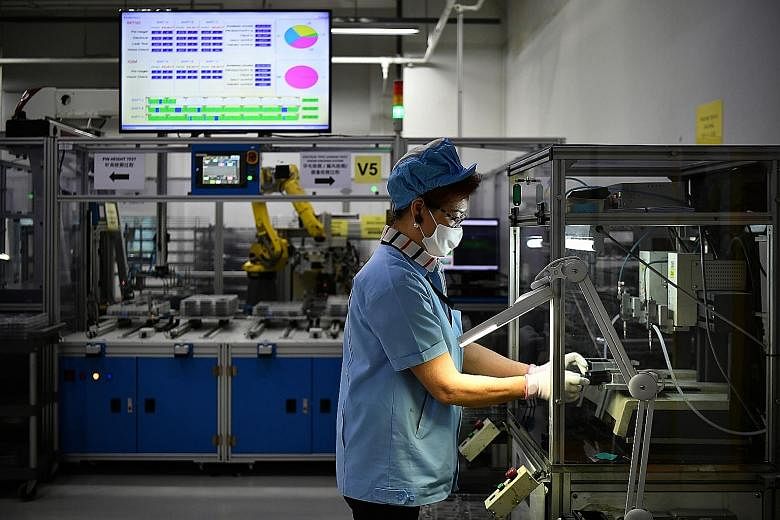The manufacturing, finance and insurance, and information and communications industries were the few bright spots in Singapore's economy last year, posting rare growth while most sectors declined amid the coronavirus pandemic.
The same industries are expected to continue seeing steady growth this year, while the economic outlook remains uneven across industries, the Ministry of Trade and Industry (MTI) noted in its economic survey released yesterday.
On the other hand, tourism and aviation-related sectors are likely to see a weaker recovery than previously expected, while other industries such as construction and marine and offshore engineering are likely to recover from the low base recorded last year.
Singapore's economy contracted 5.4 per cent last year - its worst full-year recession since independence.
The manufacturing sector saw 7.3 per cent growth year on year for the whole of last year, reversing the 1.5 per cent decline seen the previous year, due to output growth in the electronics, biomedical manufacturing and precision engineering clusters.
Manufacturing accounts for over 20 per cent of Singapore's gross domestic product, and is likely to expand at a faster pace than previously projected due to robust semiconductor demand from the 5G and automotive markets, MTI said.
DBS senior economist Irvin Seah said that while the outlook for factory production will remain buoyant given the upcycle in global electronics demand, growth momentum could slow in coming quarters as demand normalises. "Further adoption of the 5G networks and WiFi 6, on top of the continued proliferation of AI (artificial intelligence), IOT (Internet of Things), EVs (electric vehicles) and introduction of new smartphone models and wearable devices will continue to drive demand for high-end electronics parts and components, which will bode well for Singapore's manufacturing sector," he said.
The finance and insurance sector posted a 5 per cent increase last year, which was a dip from the 7.8 per cent growth in 2019.
In addition, the information and communications sector saw a 2.1 per cent uptick, falling short of the 12 per cent growth seen the previous year. The sector's growth last year was driven by the IT and information services segment, which was offset by weaker performance in the telecommunications segment.
Meanwhile, the construction sector sank 35.9 per cent year on year last year, due to lower construction demand amid the pandemic, which disrupted project implementation schedules, and a decline in construction output.
Most service sectors contracted last year, with the accommodation and transport and storage segments being the worst hit.
Prolonged travel restrictions weighed on the recovery of these two sectors, said Maybank Kim Eng's senior economist Chua Hak Bin.
Food and beverage services were also greatly affected, with a 25 per cent decline due to lower sales volumes across food caterers, restaurants and other eating places. Sales volume took a hit due to weak demand caused by the Covid-19 pandemic and public health measures such as capacity constraints, MTI said.


